Redditor Makes Neighbor Get Rid Of Her Kid’s Cat After Suffering Serious Flea Issues Because Of It
There is no doubt that we love our furry little ones. There are times we tend to sneak them in and out of buildings that don’t allow pets.
In fact, some people live with pets, mostly cats, in apartments that do not allow pets. However, there are some who want a pet but can’t even take care of them (or so it seems).
The cat flea, scientifically known as Ctenocephalides felis, is the most prevalent flea found on our pets, and it can affect both cats and dogs. There are more than 2,000 different species of fleas in the world.
The most prevalent and common type of flea found worldwide is the cat flea, which is a tiny, wingless insect that resides on the bodies of pets and feeds on their blood. Cats living indoors or outdoors can contract fleas.
Indoor cats are susceptible to contracting fleas from you or from other household pets since fleas can travel into your home through various means, including your clothing. We are not sure how the fleas in today’s story came about, but according to the Redditor who posted the story, it was from the neighbor’s cat.
The OP narrated her story to the AITA subreddit community after she and her household dealt with a serious flea issue, which prompted her to report her neighbor to the landlady. Want to find out how this story started and how it ended?
Keep scrolling and enjoy.
The Headline

The OP's husband is a teacher and had online classes

Our apartment was completely flooded
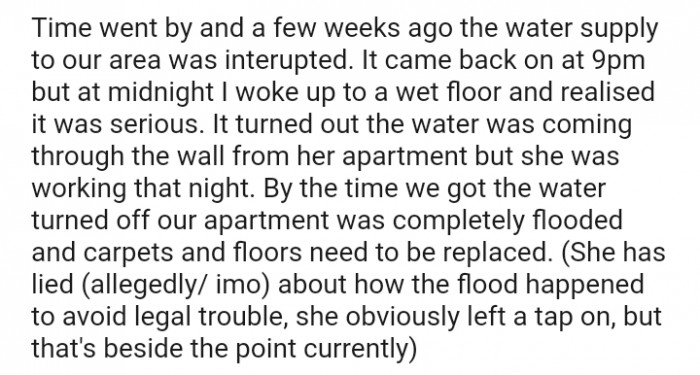
In situations where a neighbor's pet causes distress, such as a flea infestation, underlying psychological dynamics often come into play. Interpersonal conflicts can evoke strong emotional responses, as explained by the American Psychological Association. Research shows that these conflicts often trigger feelings of anger and frustration, which can escalate quickly if not managed effectively.
Understanding the root of these emotions can help individuals navigate disputes with greater empathy and communication skills.
Building rapport with neighbors can also mitigate conflicts before they escalate. Studies show that strong social connections lead to a greater sense of community and a willingness to cooperate in resolving issues. A sense of belonging can foster understanding and reduce hostility.
Start by initiating friendly conversations or communal activities, thereby enhancing relationships that will benefit all parties involved in the long run.
The Consequences of Pet Ownership Conflicts
Conflicts arising from pet ownership can have far-reaching consequences, impacting not only the pets but also the relationships between neighbors.
Dr. Jonathan Reed, a social psychologist at Columbia University, notes that unresolved disputes over pets can escalate tensions within communities.
Research indicates that clear communication and setting boundaries are essential in minimizing conflicts related to pet ownership.
She is hiding the fact that she has cats
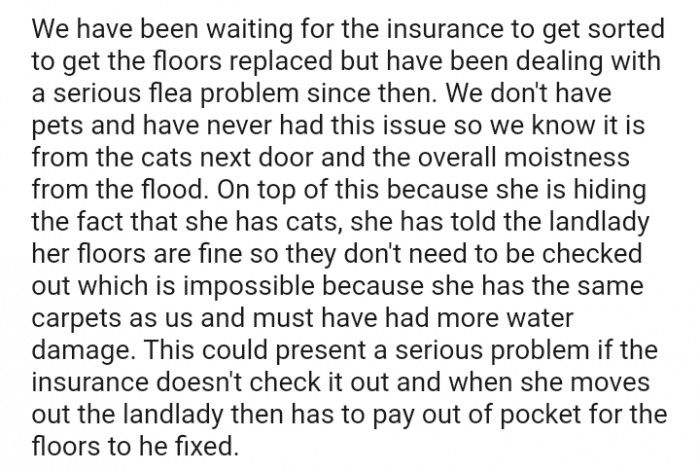
The landlady has enforced the contract
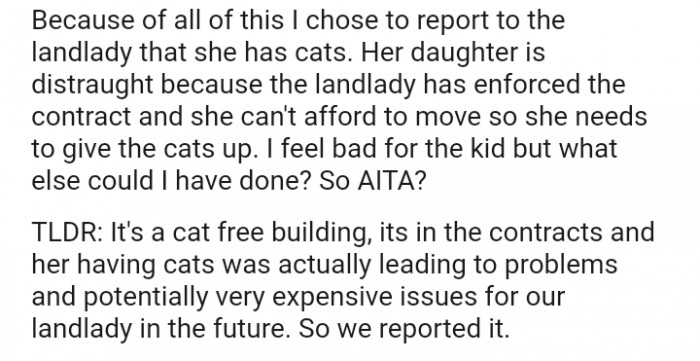
Here are a bunch of the topmost comments from Redditors.
She lost any social high ground

Behavioral Responses
A behavioral psychologist highlights that people often react defensively when they feel their boundaries are violated, as is the case here. The discomfort caused by fleas extends beyond physical irritation, triggering feelings of violation and loss of control in one's home environment.
According to studies on boundary-setting, establishing clear communication can help mitigate these conflicts. Setting boundaries in a calm manner fosters understanding and reduces the potential for hostility.
Pet-related issues often reflect broader social dynamics and cultural values regarding animals in society.
Studies show that differing views on pet ownership can lead to misunderstandings and disputes, particularly in neighborhoods where pet ownership norms vary.
Understanding these social dynamics can help facilitate more productive conversations among neighbors.
Rules are rules

You knew there was no pet rule

You just saved these people from water issue damages

The emotional attachment many have to pets can also contribute to conflicts like these. According to Dr. Kelly Brogan, a psychiatrist, "The bond between humans and their pets can evoke profound feelings, and when that bond is threatened, it can lead to significant emotional distress." This emotional investment makes it crucial to approach pet-related disputes with sensitivity, acknowledging the pet owner's feelings while also addressing the impact on those affected. As noted by Dr. Michele Weiner-Davis, a marriage therapist, "Recognizing the emotional stakes involved in pet ownership can pave the way for more compassionate and effective resolutions in conflicts involving pets."
Practical Strategies for Resolving Conflicts
To effectively manage conflicts over pets, open dialogue and negotiation are key.
Experts suggest establishing clear and respectful communication channels to address concerns before they escalate into larger disputes.
Using mediation techniques can also prove beneficial in reaching mutually acceptable solutions, ensuring that all parties feel heard and respected.
It doesn't matter if you like the rules or not

She should have actually cared for them properly

You didn't report her to get her in trouble

Cognitive Dissonance
Cognitive dissonance theory suggests that when individuals hold conflicting beliefs or attitudes, discomfort arises, leading to attempts to resolve the dissonance. In this scenario, the neighbor may feel torn between their love for their pet and the acknowledgment of the inconvenience caused.
Research indicates that addressing these internal conflicts through open dialogue can foster understanding and reduce emotional strain. Encouraging a constructive conversation may lead to a more harmonious neighborhood relationship.
Creating neighborhood agreements regarding pet ownership can foster a sense of community and cooperation.
Research shows that when communities come together to establish shared guidelines, it can significantly reduce conflicts and enhance relationships.
Encouraging collaborative discussions about pet ownership can lead to more harmonious living environments.
This was a situation that could have been avoided

That's not fair to the daughter or the cat

The OP does not want that uncertainty
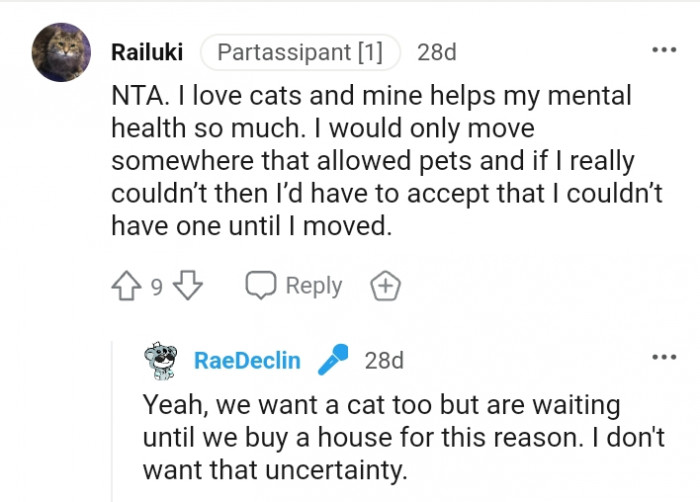
Conflict resolution strategies are essential in situations like this. A study from the University of Michigan emphasizes the importance of active listening and validation in resolving disputes. By acknowledging the neighbor's feelings while expressing your own concerns, both parties can work towards a compromise.
Consider suggesting practical solutions, such as flea treatments or adjustments in pet care, to address the issue collaboratively.
This Redditor is advising the OP to use a flea collar

The flea would have been a deal breaker

You didn't report the cats to be malicious
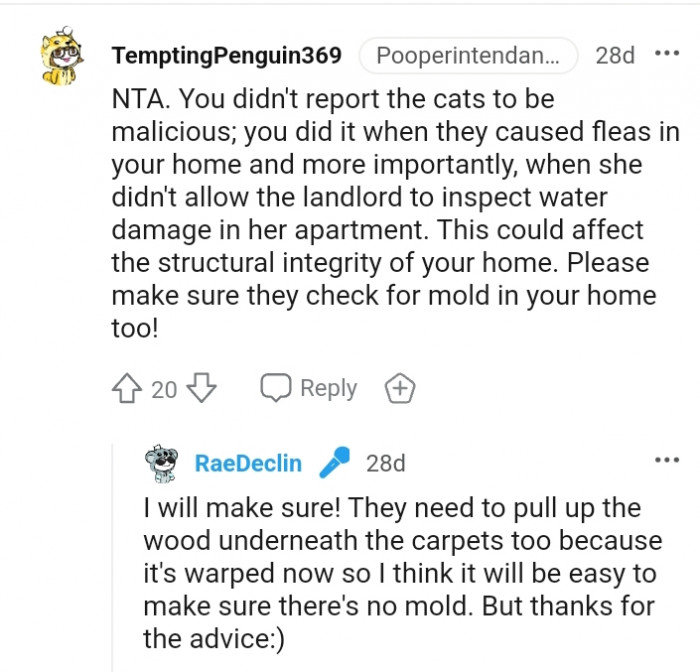
Empathy in Conflict
Empathy plays a critical role in resolving neighborhood disputes, according to Dr. Brené Brown's research on vulnerability and connection. She highlights that understanding another's perspective can reduce defensiveness and promote collaboration.
In this scenario, approaching the neighbor with empathy can facilitate a more constructive conversation. Expressing understanding of their attachment to the pet while addressing the issue can foster a cooperative spirit.
It is really as simple as that
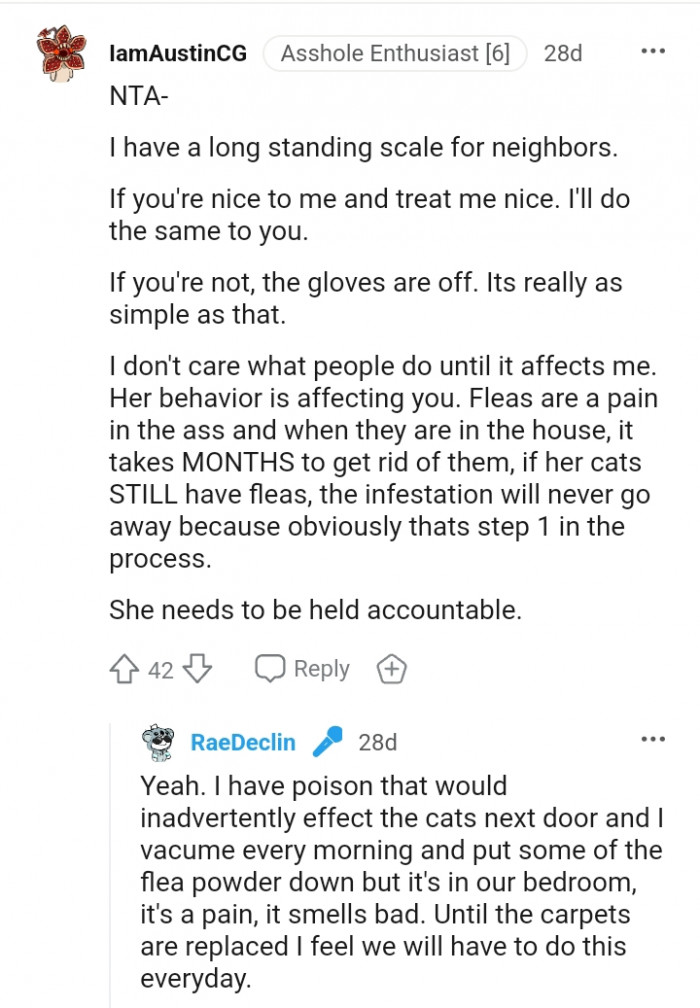
Your neighbor has been consistently rude
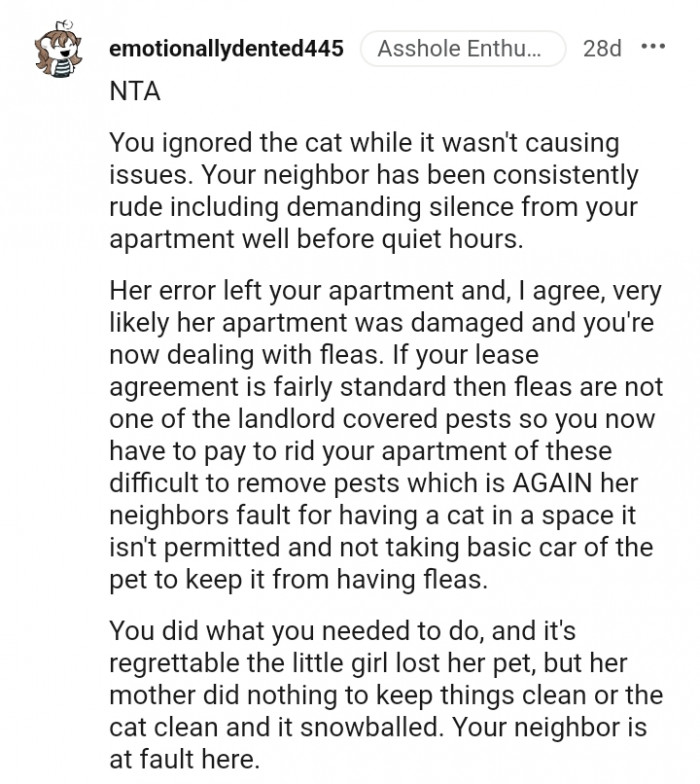
This is what should happen
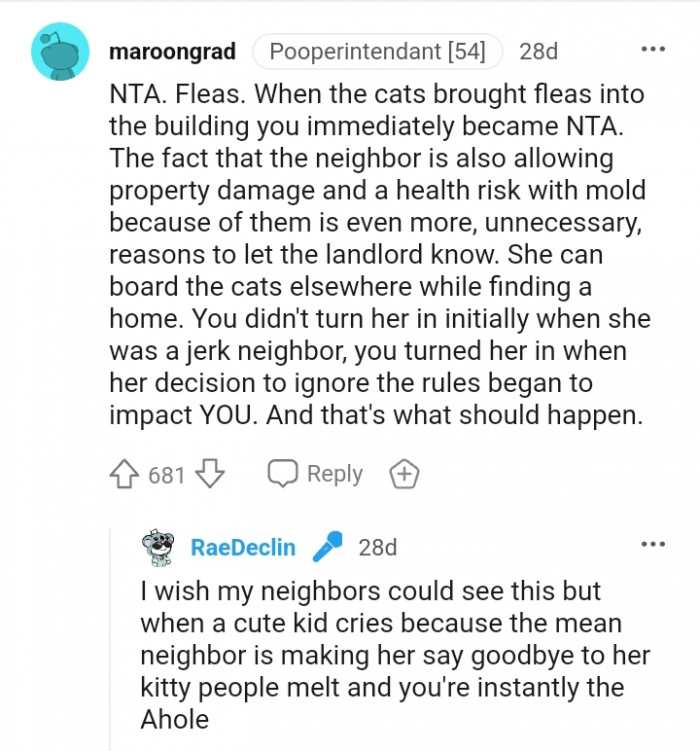
The emotional toll of living in an infested environment can lead to stress and anxiety. A study published in the journal Health Psychology indicates that chronic stress can negatively impact both mental and physical health.
It's important to address these feelings with self-care strategies. Consider engaging in mindfulness practices or seeking support from friends or professionals to manage stress during such conflicts.
Are you just making a negative assumption?
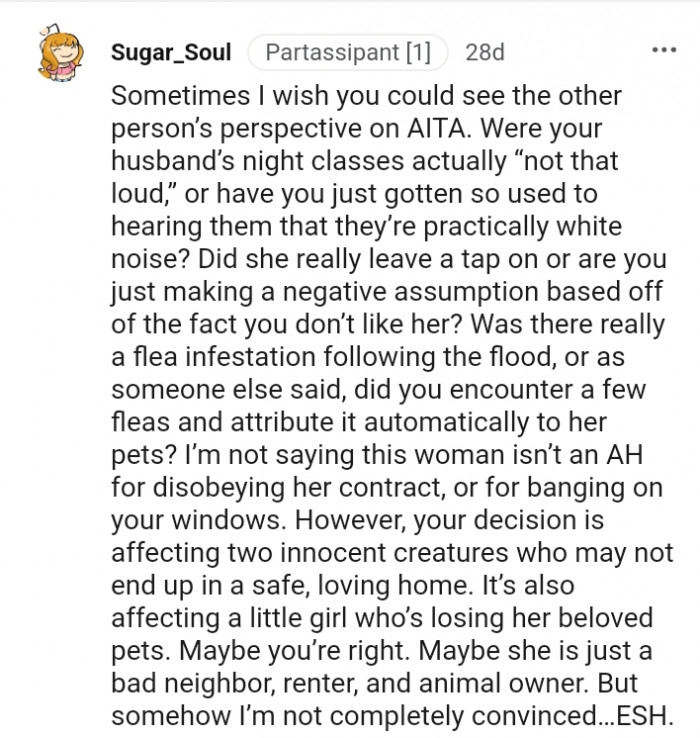
This Redditor didn't need to read everything to make a decision

A big yikes from this Redditor

Long-Term Solutions
Establishing long-term solutions to avoid similar conflicts is essential. Research from Yale University on community relationships suggests that neighborhood engagement can promote harmony and understanding.
Consider organizing neighborhood meetings to discuss pet policies and shared responsibilities. This proactive approach can help create a community framework that respects both pet ownership and shared living spaces.
This may have been a good lesson

Cat fleas thrive in warm, humid surroundings and procreate heavily in the late summer when they are most prevalent. Modern central heating, however, allows fleas on cats (and dogs) to survive and even thrive over the winter.
This indicates that you must regularly de-flea your pets, and we’re not sure the OP’s neighbor did that. Please leave your thoughts about this story below.
Psychological Analysis
This situation illustrates the challenges that can arise when differing values about pets collide.
Neighbors need to navigate these conflicts with empathy and open communication to foster a more harmonious community environment.
Analysis generated by AI
Analysis & Alternative Approaches
Addressing conflicts related to pet ownership requires an understanding of social dynamics and effective communication.
According to Dr. Michele Gelfand, cultural psychologist: 'Effective conflict resolution hinges on the ability to empathize and establish clear boundaries, which are essential for maintaining harmonious relationships.'
Solutions & Coping Strategies
In navigating disputes like the one over the cat and flea issue, applying psychological insights can lead to more effective resolutions. Research emphasizes the importance of empathy, active listening, and constructive communication in conflict resolution.
By fostering open dialogue and understanding, neighbors can work together to create a supportive environment. Ultimately, resolving such conflicts requires patience, awareness of emotional dynamics, and a commitment to strengthening community ties.



